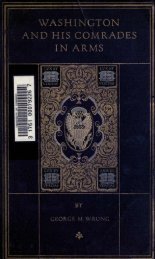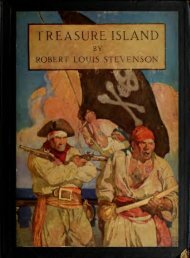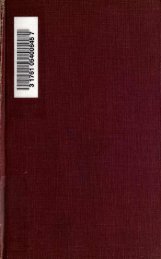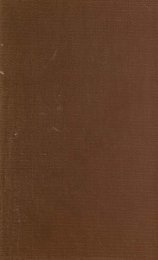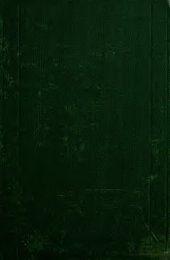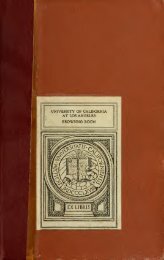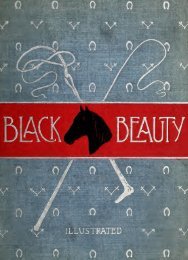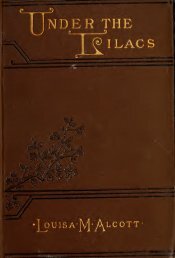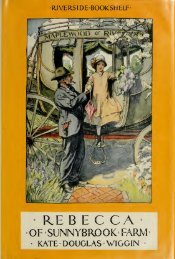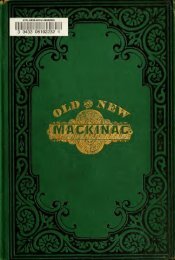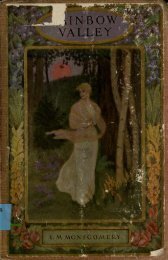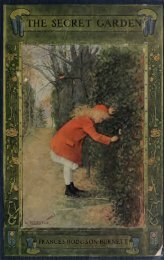- Page 8 and 9:
•••.••-Captfriaht. i3/ti
- Page 10 and 11:
VEntered according to Act of Congre
- Page 13 and 14:
PBEFACE OF THE ELEVENTH EDITION.Whe
- Page 15 and 16:
PREFACE OF THE ELEVENTH EDITION.ixt
- Page 17 and 18:
PREFACE OF THE FIRSTEDITION.The dis
- Page 19:
PREFACE OF THE FIRST EDITION.xiiidi
- Page 22 and 23:
—:xviCONTENTS.CHAPTER IV.1667-167
- Page 24 and 25:
xviiiCONTENTS.CHAPTER XHX1680.port
- Page 26 and 27:
IXCONTENTS.CHAPTER XXIL1680-1683.la
- Page 28 and 29:
xxuCONTENTS.APPENDIX.PageL Early Un
- Page 33 and 34:
LA SALLEDISCOVERY OF THE GEEAT WEST
- Page 35 and 36:
INTRODUCTION. 5River, crossed to th
- Page 37 and 38:
CHAPTER 1.1643-1669.CAVELIER DE LA
- Page 39 and 40:
1666.] LA SALLE AND THE JESUITS.him
- Page 41 and 42:
1666.] LA SALLE AT MONTREAL. 11of w
- Page 43 and 44:
1667.] LA CHINE. 13nearly adjoining
- Page 45 and 46:
1669.] SCHEMES OF DISCOVERY. 15blan
- Page 47 and 48:
;.] DEPARTURE. 17He was not ill sui
- Page 49 and 50:
CHAPTER II.1669-1671.LA SALLE AND T
- Page 51 and 52:
1669] THE SENECA VILLAGES. 21hill,i
- Page 53 and 54:
1669.] LOUIS JOLIET. 23of Lake Onta
- Page 55 and 56:
1670.] SEPARATION. 25and the use of
- Page 57 and 58:
1670.] AT STE. MARIE DU SAUT. 27thr
- Page 59 and 60:
1669-70.] LA SALLE'S DISCOVERIES. 2
- Page 61 and 62:
1669-71.] THE RIVER ILLINOIS. 31pro
- Page 63 and 64:
1671.] THE MISSISSIPPI. 33he discov
- Page 65 and 66:
;1671.] LA SALLE'S DISCOVERIES. 36H
- Page 67 and 68:
1670-72.] REPORTS OF THE JESUITS. 3
- Page 69 and 70:
"1670-72.] STE. MARIE DU SAUT. 39ao
- Page 71 and 72:
1670-72.] MARQUETTE AND ANDR& 41int
- Page 73 and 74:
;1670-72.] THE GREEN BAY MISSION. 4
- Page 75 and 76:
;1670-72.] THE CROSS AMONG THE FOXE
- Page 77 and 78:
1670-72.] TRADING WITH INDIANS. 47o
- Page 79 and 80:
;1670.] SAINT-LUSSON AND PERROT. 49
- Page 81 and 82:
;1671.] CEREMONY AT THE SAUT. 51the
- Page 83 and 84:
1671.] ALLOUEZ'S HARANGUE. 53parts
- Page 85 and 86:
1671.] ALLOUEZ'S HARANGUE. 55that h
- Page 87 and 88:
—CHAPTER V.1672-1675.THE DISCOVER
- Page 89 and 90:
1673.] MARQUETTE. 59number, Jacques
- Page 91 and 92:
;1673] DEPARTURE. 61of it, a specie
- Page 93:
;1673.] THE WISCONSIN RIVER. 63The
- Page 96 and 97:
66 THE DISCOVERY OF THE MISSISSIPPI
- Page 98 and 99:
68 THE DISCOVERY OF THE MISSISSIPPI
- Page 100 and 101:
70 THE DISCOVERY OF THE MISSISSIPPI
- Page 102 and 103:
T2 THE DISCOVERY OF THE MISSISSIPPI
- Page 104 and 105:
74 THE DISCOVERY OF THE MISSISSIPPI
- Page 106 and 107:
70 THE DISCOVERY OF THE MISSISSIPPI
- Page 108 and 109:
;78 THE DISCOVERY OF THE MISSISSIPP
- Page 110 and 111:
80 THE DISCOVERY OF THE MISSISSIPPI
- Page 112 and 113:
82 THE DISCOVERY OF THE MISSISSIPPI
- Page 114 and 115:
84 LA SALLE AND FRONTENAC. [1673-78
- Page 116 and 117:
86 LA SALLE AND FRONTENAC. [1673.th
- Page 118 and 119:
88 LA SALLE AND FRONTENAC. [16T3.a
- Page 120 and 121:
90 LA SALLE AND FRONTENAC. [1673.Fr
- Page 122 and 123:
92 LA SALLE AND FRONTENAC. [1673.re
- Page 124 and 125:
;94 LA SALLE AND FRONTENAC. [1673.B
- Page 126 and 127:
96 LA SALLE AND FRONTENAC. [1673.re
- Page 128 and 129:
98 LA SALLE AND FRONT^NAC. [1674.se
- Page 130 and 131:
100 LA SALLE AND FRONTENAC. [1674.r
- Page 132 and 133:
;i02 ;LA SALLE AND FRONTED C. [1675
- Page 134 and 135:
;104 LA SALLE AND FRONTENAC. [1675.
- Page 136 and 137:
CHAPTER VII.1678.PARTY STRIFE.La Sa
- Page 138 and 139:
;108 PARTY STRIFE. [1678.not hesita
- Page 140 and 141:
110 PARTY STRIFE. [1678admitted tha
- Page 142 and 143:
112 PARTY STRIFE. [1678.Here follow
- Page 144 and 145:
'114 PARTY STRIFE. [1678.*.JThus fa
- Page 146 and 147:
116 PARTY STRIFE. [1678.object of t
- Page 148 and 149:
";118 PARTY STRIFE. [1678.Monsieur,
- Page 150 and 151:
CHAPTER Vni.1677, 1678.THE GRAND EN
- Page 152 and 153:
122 THE GRAND ENTERPRISE. [1677.It
- Page 154 and 155:
124 THE GRAND ENTERPRISE. [1678.him
- Page 156 and 157:
126 THE GRAND ENTERPRISE [1678.memo
- Page 158 and 159:
128 THE GRAND ENTERPRISE. [1678.off
- Page 160 and 161:
130 THE GRAND ENTERPRISE. [1678.cha
- Page 162 and 163:
132 LA SALLE AT NIAGARA. [1678.carr
- Page 164 and 165:
134 LA SALLE AT NIAGARA. [1678,Holl
- Page 166 and 167:
;136 LA SALLE AT NIAGARA. [1678.Jar
- Page 168 and 169:
138 LA SALLE AT NIAGARA. [1678.Taia
- Page 170 and 171:
140 LA SALLE AT NIAGARA. [1678,La M
- Page 172 and 173:
142 LA SALLE AT NIAGARA. [1679.in a
- Page 174 and 175:
CHAPTER X.1679.THE LAUNCH OF THE "G
- Page 176 and 177:
146 THE LAUNCH OF THE "GRIFFIN." [1
- Page 178 and 179:
;148 THE LAUNCH OF THE "GRIFFIN." [
- Page 180 and 181:
;150 THE LAUNCH OF THE « GRIFFIN."
- Page 182 and 183:
152 LA SALLE ON THE UPPER LAKES. [1
- Page 184 and 185:
154 LA SALLE ON THE UPPER LAKES. [1
- Page 186 and 187:
156 LA SALLE ON THE UPPER LAKES. [1
- Page 188 and 189:
158 LA SALLE ON THE UPPER LAKES. [1
- Page 190 and 191:
160 LA SALLE ON THE UPPER LAKES. [1
- Page 192 and 193:
162 LA SALLE ON THE UPPER LAKES. [1
- Page 194 and 195:
CHAPTER XII.1679, 1680.LA SALLE ON
- Page 196 and 197:
;166 LA SALLE ON THE ILLINOIS [lawt
- Page 198 and 199:
168 LA SALLE ON THE ILLINOIS. [1679
- Page 200 and 201:
170 LA SALLE ON THE ILLINOIS. [1679
- Page 202 and 203:
;172 LA SALLE ON THE ILLINOIS. [168
- Page 204 and 205:
174 LA SALLE ON THE ILLINOIS. [1680
- Page 206 and 207:
176 LA SALLE ON THE ILLINOIS. [1680
- Page 208 and 209:
178 LA SALLE ON THE ILLINOIS. [1680
- Page 210 and 211:
CHAPTER XIII.1680.FORT CRfeVECCEUR.
- Page 212 and 213:
;182 FORT CR^VECCEUR. [1680.doubt,
- Page 214 and 215:
184 FORT CR&VECCEUR. [1680.engage h
- Page 216 and 217:
186 FORT CRfcVECOEUR. [1680.efforts
- Page 218 and 219:
188 FORT CREVECCEUR. [1680.His part
- Page 220 and 221:
190 HARDIHOOD OF LA SALLE. [1680.ti
- Page 222 and 223:
192 HARDIHOOD OF LA SALLE. [1680On
- Page 224 and 225:
192 HARDIHOOD OF LA SALLE. [1680On
- Page 226 and 227:
194 HARDIHOOD OF LA SALLE. [1680.se
- Page 228 and 229: X96 HARDIHOOD OF LA SALLE. [1680.la
- Page 230 and 231: 200 HARDIHOOD OF LA SALLE. [1G80,St
- Page 232 and 233: CHAPTER XV.1680.INDIAN CONQUERORS.T
- Page 234 and 235: 204 INDIAN CONQUERORS. [1680.rest.
- Page 236 and 237: 206 INDIAN CONQUERORS. [1680.saw no
- Page 238 and 239: "208 INDIAN CONQUERORS. [1(580.ing.
- Page 240 and 241: 210 INDIAN CONQUERORS. [1680.watch.
- Page 242 and 243: 212 INDIAN CONQUERORS. [1680.of wom
- Page 244 and 245: 214 INDIAN CONQUERORS. [1QS1.of the
- Page 246 and 247: CHAPTER XVI.1680.TONTY AND THE IROQ
- Page 248 and 249: 218 TONTY AND THE IROQUOIS. [1680.y
- Page 250 and 251: 220 TONTY AND THE IROQUOIS. [1680.r
- Page 252 and 253: 222 TONJY AND THE IROQUOIS. [1880.o
- Page 254 and 255: .224 TONTY AND THE IROQUOIS. [1680.
- Page 256 and 257: ;226 TONTY AND THE IROQUOIS. [1680.
- Page 258 and 259: 228 TONTY AND THE IROQUOIS. [1680fi
- Page 260 and 261: ;230 TONTY AND THE IROQUOIS. [1680,
- Page 262 and 263: 232 TONTY AND THE IROQUOIS. [1680.j
- Page 264 and 265: 234 TONTY AND THE IROQUOIS. [1680.b
- Page 266 and 267: 234 TONTY AND THE IROQUOIS. [1680.b
- Page 268 and 269: 236 TONTY AND THE IROQUOIS. [1680.o
- Page 270 and 271: 238 TONTY AND THE IROQUOIS. [1680.T
- Page 272 and 273: 240 THE ILLINOIS TOWN. [1680.a half
- Page 274 and 275: CHAPTER XVII.1680.THE ADVENTURES OF
- Page 276 and 277: ;246 THE ADVENTURES OF HENNEPIN. [1
- Page 280 and 281: 250 THE ADVENTURES OF HENNEPIN". [1
- Page 282 and 283: 252 THE ADVENTURES OF HENNEPIN. [16
- Page 284 and 285: 254 THE ADVENTURES OF HENNEPIN. [16
- Page 287 and 288: ;1680.] A HARD JOURNEY. 257of the h
- Page 289 and 290: CHAPTER XVIII.1680, 1681.HENNEPIN A
- Page 291 and 292: 1680.] THE SIOUX. 261This soothed h
- Page 293 and 294: 1680.] HENNEPIN AS A MISSIONARY. 26
- Page 295 and 296: 1680.] CAMP OF SAVAGES. 265at the m
- Page 297 and 298: ;1680.] FALLS OF ST. ANTHONY. 267sk
- Page 299 and 300: 1680.] ADVENTURES. 269which he at l
- Page 301 and 302: 1680.] THE UPPER MISSISSIPPI. 271de
- Page 303 and 304: 1680.] HE REJOINS THE INDIANS. 273T
- Page 305 and 306: 1680.] DU LHUT'S EXPLORATIONS. 275m
- Page 307 and 308: 1680.] DU LHUT'S EXPLORATIONS. 277c
- Page 309 and 310: 1681.] THE RETURN. 279way to attack
- Page 311 and 312: ;1681.] LA SALLE'S LETTERS. 281stor
- Page 313 and 314: CHAPTER XIX.1681.LA SALLE BEGINS AN
- Page 315 and 316: 1681.] INDIAN FRIENDS. 285from thei
- Page 317 and 318: 1681.] ILLINOIS ALLIES. 287Forest a
- Page 319 and 320: 1681.] GRAND COUNCIL. 289them to a
- Page 321 and 322: 1681.] THE CHIEFS REPLY. 291if the
- Page 323 and 324: 1681.] THE TORONTO PORTAGE. 293secr
- Page 325 and 326: CHAPTER XX.1681-1682.SUCCESS OF LA
- Page 327 and 328: 1682.] PRUDHOMME. 297his canoes alo
- Page 329 and 330:
1682.] THE ARKANSAS. 299Meanwhile t
- Page 331 and 332:
1682.] THE TAENSAS. 301river. 1 Her
- Page 333 and 334:
1682.] THE NATCHEZ. 303the path and
- Page 335 and 336:
1682,] HOSTILITY. 305La Salle plant
- Page 337 and 338:
1682.] POSSESSION TAKEN. 307sion of
- Page 339 and 340:
FortCHAPTER XXI.1682, 1683.ST. LOUI
- Page 341 and 342:
1682.] ILLNESS OF LA SALLE. 311ward
- Page 343 and 344:
1682.] "STARVED HOCK." 313to provid
- Page 345:
jj^ Tacaogane
- Page 348 and 349:
316 ST LOUTS OF THE ILLINOIS. [1682
- Page 350 and 351:
318 ST. LOUIS OF THE ILLINOIS. [168
- Page 352 and 353:
"320 ST. LOUIS OF THE ILLINOIS. [16
- Page 354 and 355:
322 ST. LOUIS OF THE ILLINOIS. [168
- Page 356 and 357:
:324 ST. LOUIS OF THE ILLINOIS. [16
- Page 358 and 359:
;326 ST. LOUIS OF THE ILLINOIS. [16
- Page 360 and 361:
CHAPTER XXII.1680-1683.LA SALLE PAI
- Page 362 and 363:
830 LA SALLE PAINTED BY HIMSELF. [1
- Page 364 and 365:
"332 LA SALLE PAINTED BY HIMSELF. [
- Page 366 and 367:
"334 LA SALLE PAINTED BY HIMSELF. [
- Page 368 and 369:
;836 LA SALLE PAINTED BY HIMSELF. [
- Page 370 and 371:
338 LA SALLE PAINTED BY HIMSELF. [1
- Page 372 and 373:
;v/340 LA SALLE PAINTED BY HIMSELF.
- Page 374 and 375:
;/342 LA SALLE PAINTED BY HIMSELF.
- Page 376 and 377:
;344 A NEW ENTERPRISE. [1684losophy
- Page 378 and 379:
346 A NEW ENTERPRISE. [1684.resourc
- Page 380 and 381:
;848 A NEW ENTERPRISE. [1684.Such,
- Page 382 and 383:
;350 A NEW ENTERPRISE. [1684.Even w
- Page 384 and 385:
352 A NEW ENTERPRISE. [1684.A chief
- Page 386 and 387:
354 A NEW ENTERPRISE. [1684.impenet
- Page 388 and 389:
856 A NEW ENTERPRISE. [1684.that M.
- Page 390 and 391:
358 A NEW ENTERPRISE. [1684.came to
- Page 392 and 393:
360 A NEW ENTERPRISE. [1684,the sam
- Page 394 and 395:
'362 A NEW ENTERPRISE. [1684.him tw
- Page 396 and 397:
364 A NEW ENTERPRISE. [1«84.priest
- Page 398 and 399:
CHAPTER XXIV.1684, 1685.THE VOYAGE.
- Page 400 and 401:
;368 THE VOYAGE. [1684.board, and L
- Page 402 and 403:
370 THE VOYAGE. [1684.his correspon
- Page 404 and 405:
372 THE VOYAGE. [1684.While Beaujeu
- Page 406 and 407:
;374 THE VOYAGE. [1685.of the low s
- Page 408 and 409:
376 THE VOYAGE. [1685.he knew ;for
- Page 410 and 411:
;CHAPTER XXV.1685.LA SALLE IN TEXAS
- Page 412 and 413:
380 LA SALLE IN TEXAS. [1685.were s
- Page 414 and 415:
382 LA SALLE IN TEXAS. [1685.with s
- Page 416 and 417:
384 LA SALLE IN TEXAS. [1685.knew n
- Page 418 and 419:
886 LA SALLE IN TEXAS. [1685your ir
- Page 420 and 421:
388 LA SALLE IN TEXAS. [1685reached
- Page 422 and 423:
890 LA SALLE IN TEXAS. [1685.intend
- Page 424 and 425:
892 ST. LOUIS OF TEXAS. [1685.La Va
- Page 426 and 427:
394 ST. LOUIS OF TEXAS. [1685.follo
- Page 428 and 429:
896 ST. LOUIS OP TEXAS. [1685.It wa
- Page 430 and 431:
398 ST. LOUIS OF TEXAS. [1685.decea
- Page 432 and 433:
400 ST. LOUIS OF TEXAS. [1686.bull,
- Page 434 and 435:
402 ST. LOUIS OF TEXAS. [1686.upon
- Page 436 and 437:
404 ST. LOUIS OF TEXAS. [1686.now r
- Page 438 and 439:
'406 ST. LOUIS OF TEXAS. [1688.mass
- Page 440 and 441:
408 ST. LOUIS OF TEXAS. [1686.us, p
- Page 442 and 443:
;410 ST. LOUIS OF TEXAS. [1689.in a
- Page 444 and 445:
412 ST. LOUIS OF TEXAS. [1686.Wiirt
- Page 446 and 447:
414 ST. LOUIS OF TEXAS. [168(5.visi
- Page 448 and 449:
416 ST. LOUIS OF TEXAS. [1686.with
- Page 450 and 451:
—418 ST. LOUIS OF TEXAS. [1687.La
- Page 452 and 453:
;CHAPTER XXVII.1687.ASSASSINATION O
- Page 454 and 455:
";422 ASSASSINATION OF LA SALLE. [1
- Page 456 and 457:
424 ASSASSINATION OF LA SALLE. [168
- Page 458 and 459:
426 ASSASSINATION OF LA SALLE. [168
- Page 460 and 461:
428 ASSASSINATION OF LA SALLE. [168
- Page 462 and 463:
430 ASSASSINATION OF LA SALLE. [168
- Page 464 and 465:
, crusader,432 ASSASSINATION OF LA
- Page 466 and 467:
434 ASSASSINATION OF LA SALLE. [168
- Page 468 and 469:
436 THE INNOCENT AND THE GUILTY. [1
- Page 470 and 471:
438 THE INNOCENT AND THE GUILTY. [1
- Page 472 and 473:
440 THE INNOCENT AND THE GUILTY. [1
- Page 474 and 475:
442 THE INNOCENT AND THE GUILTY. [1
- Page 476 and 477:
444 THE INNOCENT AND THE GUILTY. [1
- Page 478 and 479:
446 THE INNOCENT AND THE GUILTY. [1
- Page 480 and 481:
448 THE INNOCENT AND THE GUILTY. [1
- Page 482 and 483:
450 THE INNOCENT AND THE GUILTY. [1
- Page 484 and 485:
452 THE INNOCENT AND THE GUILTY. [1
- Page 486 and 487:
454 THE INNOCENT AND THE GUILTY. [1
- Page 488 and 489:
456 THE INNOCENT AND THE GUILTY. [1
- Page 490 and 491:
458 THE INNOCENT AND THE GUILTY. [1
- Page 492 and 493:
460 THE INNOCENT AND THE GUILTY. [1
- Page 494 and 495:
462 THE INNOCENT AND THE GUILTY. [1
- Page 496 and 497:
CHAPTER XXIX.1688-1689.FATE OF THE
- Page 498 and 499:
466 FATE OF THE TEXAN COLONY. [1689
- Page 500 and 501:
468 FATE OF THE TEXAN COLONY. [1689
- Page 502 and 503:
V470 FATE OF THE TEXAN COLONY. [168
- Page 505 and 506:
APPENDIX.LEARLY UNPUBLISHED MAPS OF
- Page 507 and 508:
;APPENDIX. 477Lake Superior is " La
- Page 509 and 510:
APPENDIX. 479may be of later date t
- Page 511 and 512:
"APPENDIX. 481of the Mississippi. B
- Page 513 and 514:
APPENDIX. 488his victim La Salle, h
- Page 515 and 516:
APPENDIX. 485second map, La Salle's
- Page 517 and 518:
APPENDIX. 487While thus employed, t
- Page 519 and 520:
APPENDIX. 489had sworn "by the sky,
- Page 521:
APPENDIX. 489had sworn by the sky,
- Page 525 and 526:
;INDEX.Abenakis, the, 285, 295, 316
- Page 527 and 528:
;;Bolton, Captain, reaches the Miss
- Page 529 and 530:
;;INDEX. 49735, 244, 307, 346, 376,
- Page 531 and 532:
;;INDEX. 499Esmanville, the priest,
- Page 533 and 534:
; ;;Hagaren, King of the Acanibas,4
- Page 535 and 536:
|INDEX. 501Abenakis,Acanibas,Agnier
- Page 537 and 538:
;. 318,INDEX. 606riage to Claire Bi
- Page 539 and 540:
;15;INDEX. 601mended to Colbert by
- Page 541 and 542:
;INDEX.MiLouis restored by the King
- Page 543 and 544:
;;;INDEX. 511takes possession for F
- Page 545 and 546:
;;INDEX. 513returns to, 215, 283, 2
- Page 547 and 548:
INDEX. 515North Sea, the, 38.Nueces
- Page 549 and 550:
Quapaws, the, 300.Quebec, 15; the J
- Page 551 and 552:
;3auteurs, the, 39 ; the village of
- Page 553 and 554:
;;Texan expedition, La Salle's, 391
- Page 556 and 557:
LD 21A-45m-9,'67(H5067sl0)476BGener



